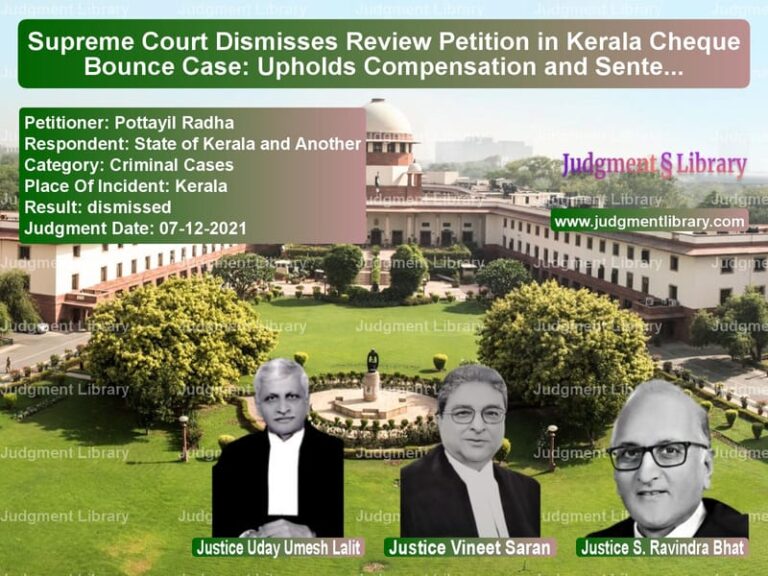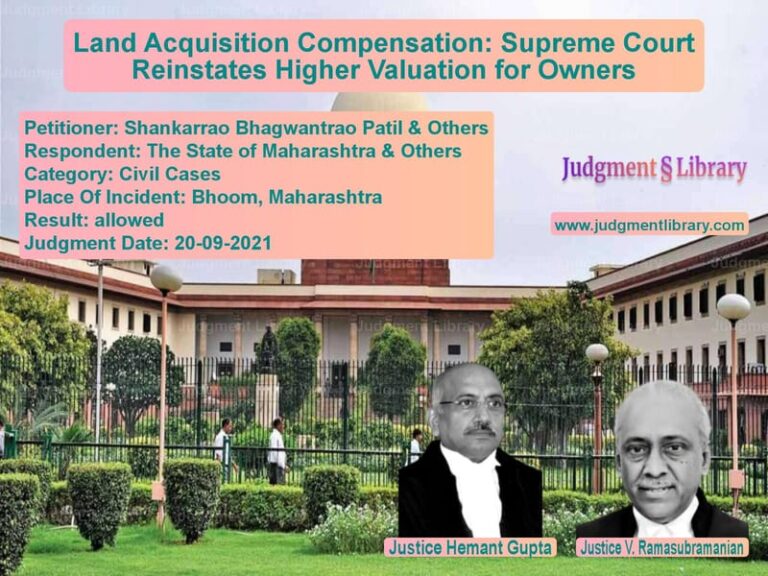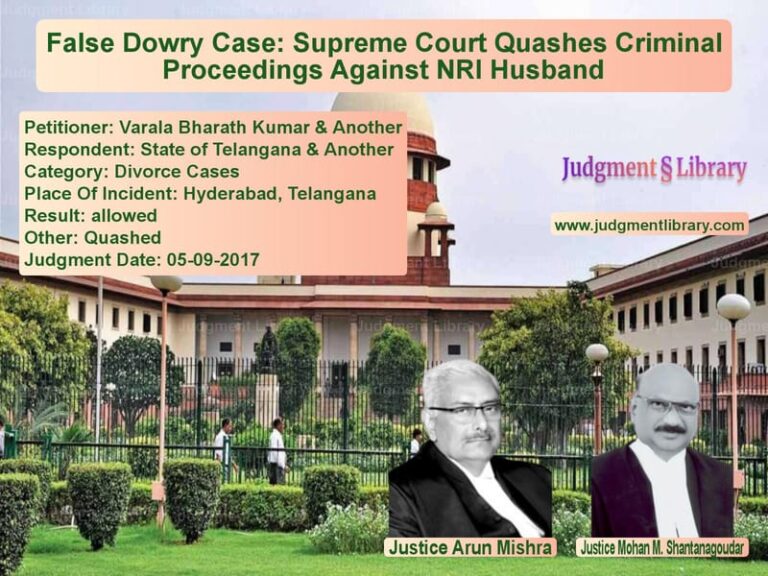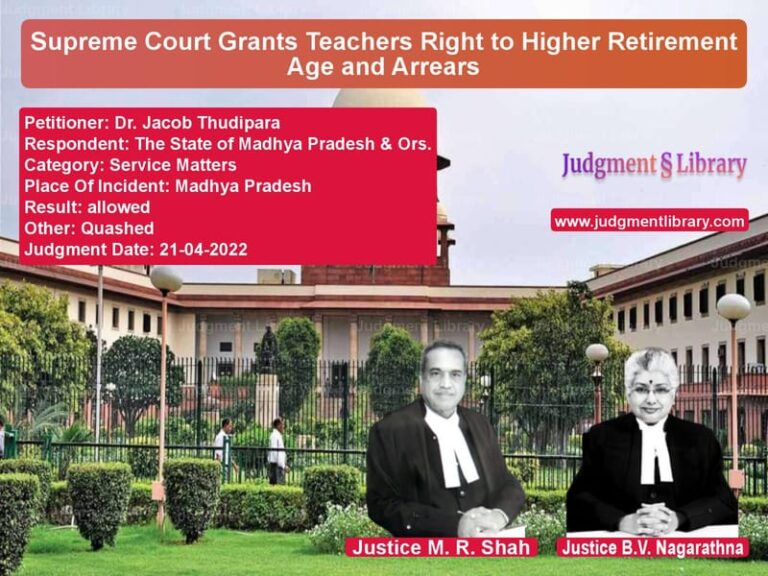West Bengal Vice-Chancellor Appointments: Supreme Court Resolves Dispute
The Supreme Court of India, in its judgment dated July 8, 2024, addressed a long-standing dispute over the appointment of Vice-Chancellors in state-aided universities in West Bengal. The case, The State of West Bengal vs. Dr. Sanat Kumar Ghosh & Ors., revolved around the authority to appoint Vice-Chancellors and the procedural violations in past appointments. The Court’s intervention was necessary due to an ongoing deadlock between the State Government and the Governor of West Bengal, who also serves as the Chancellor of the universities.
Background of the Case
West Bengal has approximately 35 state-aided universities, where the appointment of Vice-Chancellors became a contentious issue. In 2022, the State Government appointed 24 Vice-Chancellors without following the prescribed procedure under the University Grants Commission (UGC) Regulations, 2018. These appointments were challenged in a Public Interest Litigation (PIL) before the Calcutta High Court, which ruled that the appointments were unsustainable as the Search Committees formed by the State Government did not include a member nominated by the Chairman of the UGC. The Division Bench of the High Court upheld this ruling, leading to an appeal before the Supreme Court.
Dispute Between the State Government and the Governor
Following the High Court’s decision, the State Government amended its university laws in line with the UGC Regulations. However, instead of initiating fresh appointments as per the prescribed process, the State Education Minister sent a proposal to the Governor (Chancellor) on May 18, 2023, seeking an extension of the tenure of 27 Vice-Chancellors whose terms were expiring. The Governor, instead of approving this extension, appointed 28 Interim Vice-Chancellors across various universities. These appointments were again challenged in a PIL before the High Court.
High Court’s Ruling and Supreme Court Stay
The Calcutta High Court, in its judgment dated June 28, 2023, dismissed the PIL and allowed the continuation of these Interim Vice-Chancellors. The High Court also granted them salary, perks, and other benefits equivalent to regular Vice-Chancellors, even though the Chancellor himself had not granted such benefits.
The Supreme Court, in an interim order dated October 6, 2023, stayed the High Court’s decision regarding salary and benefits, questioning the legality of the Chancellor’s unilateral appointment of interim Vice-Chancellors without State Government consultation.
Supreme Court’s Observations and Rulings
1. Legality of Chancellor’s Appointments
- The Supreme Court prima facie disapproved of the Governor’s action in appointing Vice-Chancellors without consulting the State Government.
- It noted that such appointments violated the principles of federal governance, where education is a subject under the Concurrent List.
- Consequently, all further unilateral appointments by the Governor were stayed.
2. Stalemate in Vice-Chancellor Appointments
The Court recognized that due to the ongoing power struggle:
- No regular Vice-Chancellors were appointed.
- Interim Vice-Chancellors faced legal uncertainty.
- The administrative functioning of universities was severely hampered.
3. Constitution of a Court-Monitored Search Committee
Given the deadlock, the Supreme Court took the unprecedented step of constituting Search-cum-Selection Committees under its supervision. The process was as follows:
- Both the State Government and the Governor were asked to submit names for the Search Committees.
- Several rounds of meetings were held between September 2023 and May 2024 to resolve differences.
- The Court directed that the Chief Minister could propose eminent personalities for appointment.
- The Chancellor was required to approve these names within 10 days.
4. Appointment of a Neutral Chairperson
To ensure impartiality, the Supreme Court appointed Justice Uday Umesh Lalit, former Chief Justice of India, as the Chairperson of the Search Committee. The Chairperson was authorized to:
- Constitute separate or joint committees for universities based on disciplines.
- Shortlist candidates based on academic excellence, integrity, and administrative capabilities.
- Ensure compliance with UGC regulations.
Final Directions of the Supreme Court
- The Search Committees were directed to finalize Vice-Chancellor appointments within three months.
- The State Government was tasked with issuing advertisements for the posts within four weeks.
- The Chief Minister and Chancellor were required to collaborate and approve appointments within a fixed timeline.
- If any dispute arose between the Chief Minister and Chancellor regarding appointments, the matter would be referred back to the Supreme Court.
Key Takeaways
- Judicial Oversight in University Appointments: The Supreme Court ensured fair and transparent selection by intervening in the process.
- Federalism and Education: The ruling reinforced that both State Governments and Governors must adhere to established procedures.
- Role of UGC Regulations: Compliance with UGC norms was made mandatory for all university appointments.
- Resolution of Political Stalemates: The Court facilitated an institutional mechanism to end the deadlock between the State and the Governor.
Conclusion
The Supreme Court’s intervention in this case sets an important precedent for university governance in India. By ensuring that Vice-Chancellors are appointed through an impartial and transparent process, the judgment safeguards academic autonomy and prevents political interference in higher education administration.
Read also: https://judgmentlibrary.com/supreme-court-dismisses-appeal-in-manipur-election-petition-case/
Petitioner Name: The State of West Bengal.Respondent Name: Dr. Sanat Kumar Ghosh & Ors..Judgment By: Justice Surya Kant, Justice K.V. Viswanathan.Place Of Incident: West Bengal.Judgment Date: 07-07-2024.
Don’t miss out on the full details! Download the complete judgment in PDF format below and gain valuable insights instantly!
Download Judgment: the-state-of-west-be-vs-dr.-sanat-kumar-ghos-supreme-court-of-india-judgment-dated-07-07-2024.pdf
Directly Download Judgment: Directly download this Judgment
See all petitions in Fundamental Rights
See all petitions in Public Interest Litigation
See all petitions in Separation of Powers
See all petitions in Judgment by Surya Kant
See all petitions in Judgment by K.V. Viswanathan
See all petitions in allowed
See all petitions in Remanded
See all petitions in supreme court of India judgments July 2024
See all petitions in 2024 judgments
See all posts in Constitutional Cases Category
See all allowed petitions in Constitutional Cases Category
See all Dismissed petitions in Constitutional Cases Category
See all partially allowed petitions in Constitutional Cases Category







